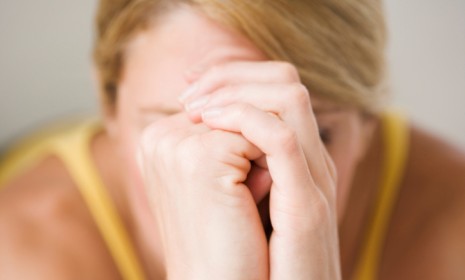Could even mild anxiety shorten your life?
Try not to worry: An exhaustive new study reveals that even minor cases of depression and anxiety increase your risk of deadly heart attacks

A free daily email with the biggest news stories of the day – and the best features from TheWeek.com
You are now subscribed
Your newsletter sign-up was successful
Take a deep breath. A large new British study suggests a strong link between even mild cases of anxiety or depression and a person's lifespan. Here's what you should know:
How was this study conducted?
A team of researchers from the University College London and the University of Edinburgh analyzed more than 68,000 adults over age 35 for 10 years. From 1994 to 2004, participants were evaluated and monitored for mental health problems like depression and anxiety, conditions that were also ranked for severity.
The Week
Escape your echo chamber. Get the facts behind the news, plus analysis from multiple perspectives.

Sign up for The Week's Free Newsletters
From our morning news briefing to a weekly Good News Newsletter, get the best of The Week delivered directly to your inbox.
From our morning news briefing to a weekly Good News Newsletter, get the best of The Week delivered directly to your inbox.
What did researchers discover?
Psychological distress raises the risk of premature death in a number of concerning ways. For example, people with serious mental health issues are 41 percent more likely to die from cancer. But perhaps more alarmingly, researchers discovered that patients with even minor levels of psychological distress had a significantly higher risk of dying over the 10-year study period.
What kind of things were killing them?
Compared with people with negligible levels of anxiety and depression, people with even low levels of psychological distress had a 23 percent higher likelihood of dying from accidents or injuries (like a car crash), and were 25 percent more likely to die from heart disease, a stroke, or heart failure.
A free daily email with the biggest news stories of the day – and the best features from TheWeek.com
Why are mildly anxious people more likely to die young?
It could be that even low levels of psychological distress promote "inflammation and the release of stress hormones, which have a demonstrated ill effect on heart health as well as cancer," says Amanda Gardner at Health.com. Even a brief surge of adrenaline or other stress-related chemicals could cause "fatty plaques in narrowed arteries to rupture," leading to dangerous cardiovascular incidents or stroke.
So... what should people with depression or anxiety do?
Focus on finding a proper balance between work and personal life, says Ryan Jaslow at CBS News. Getting a full night's rest, adopting a healthy diet, and exercising are proven ways to reduce stress. And remember, depressed and anxious folks aren't "automatically doomed to an early death," says Jenn Savedge at Mother Nature Network. But these results are a "good indication that those who suffer from depression and anxiety — even in low doses — should seek treatment."
Sources: CBS News, Health.com, Mother Nature Network, Sci-Tech Today
-
 The environmental cost of GLP-1s
The environmental cost of GLP-1sThe explainer Producing the drugs is a dirty process
-
 Greenland’s capital becomes ground zero for the country’s diplomatic straits
Greenland’s capital becomes ground zero for the country’s diplomatic straitsIN THE SPOTLIGHT A flurry of new consular activity in Nuuk shows how important Greenland has become to Europeans’ anxiety about American imperialism
-
 ‘This is something that happens all too often’
‘This is something that happens all too often’Instant Opinion Opinion, comment and editorials of the day